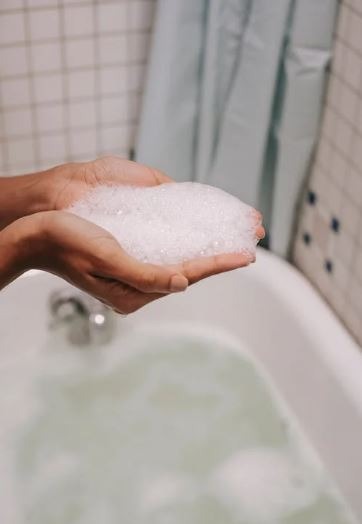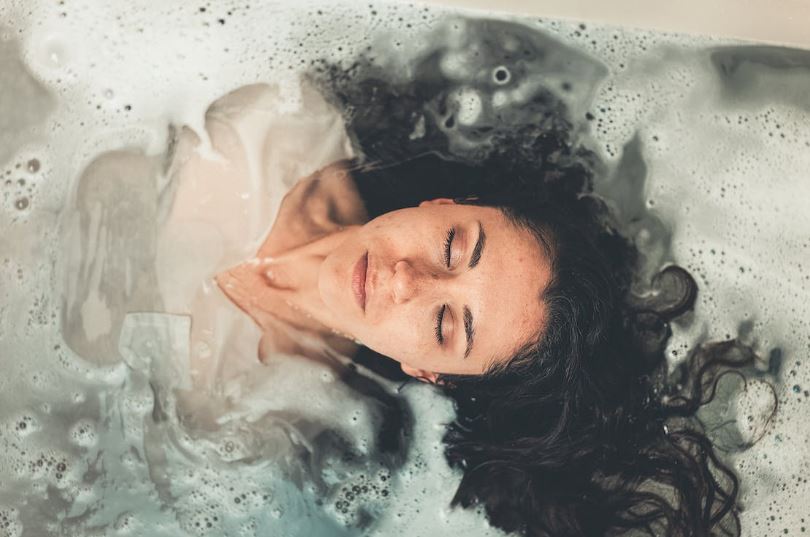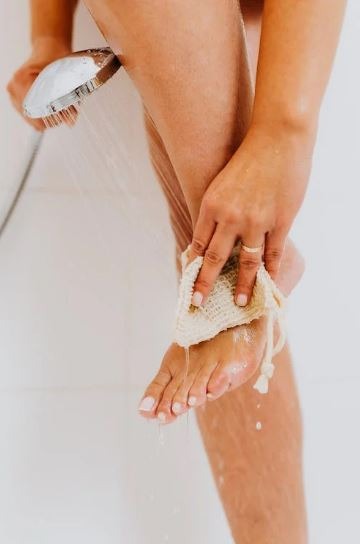Getting into a warm bath can help reduce feelings of tension and anxiety, according to a number of studies. A body that is submerged in a bath that is equipped with jets has been proved by research to have additional healing effects. Moving water activates touch receptors in the skin, which relaxes tense muscles. Additionally, the steam helps to clear your lungs, which further contributes to the overall feeling of well-being.
Bathing Procedure with Step-by-Step Instructions:
- Rinse it out! Before soaking in the bathtub, some individuals prefer to take a fast shower to remove any dirt from their body.
- Perform a cursory cleaning of the tub. Using a paper towel or cloth, clean the interior of the bathtub to remove any soap residue or stray hairs that may have accumulated.
- Fill the bathtub with lukewarm or barely warm water. Extremely hot water will burn your skin, and even slightly too hot water will dry up your skin. You can carefully determine the water’s temperature by using your hand.
- You can lather your body with soap using a washcloth or a loofah while you’re in the tub. Be wary of over-exfoliating your skin. It is better to wash your skin at the beginning of the bath, as your skin will become softer and more susceptible to over-exfoliation while you bathe.
- You are not required to wash your hair after every bath. If you choose to do so, you must first shampoo your hair, paying special attention to the nape of your neck and your scalp. Use a cup of water or a showerhead attachment to rinse off the soap.
- Massage conditioner into your hair, paying specific attention to the ends. Rinse your hair with a cup of water or a showerhead attachment, and finish with a last rinse of chilly water to seal the hair cuticles.
- After bathing, towel-dry your body and apply a moisturizer immediately to lock moisture into your skin.
Do you need to take a shower before a bath?
Take a shower first. It can appear to be unnecessary. Although this may seem like a hassle, you will find that it makes your showering experience much more enjoyable. When you take a fast shower before stepping into the tub, you won’t have to worry about getting all of the nooks and crannies of your body clean. Instead, you’ll be able to concentrate only on relaxation and rejuvenation.
Start with a shower before getting into the tub. A standard, speedy shower with soap and shampoo. It takes up two minutes of your time. After then, and only then, stop the flow of water by plugging the drain and throwing the diverter, which causes the already-hot water to spray out of my faucet. Next, wait for the water in the tub to reach the desired temperature, and then give in to the euphoria that comes from taking a nice, hot bath. Because you rinsed off that dirt before taking a bath, you do not wallow in your own dirt for any significant amount of time whenever you are in the bath.
There is a good reason why you are strongly encouraged, and in some cases even obliged, to take a shower prior to entering public swimming pools, hotel Jacuzzis and hot tubs located anywhere in the world. Why do you believe that the principles of hydrodynamics and surfactancy do not apply in your very own bathroom?
In Japanese culture, bathing is preceded by cleansing the body. According to this interpretation, the tub “is only used for soaking.” And you should listen to the Japanese when it comes to restroom matters, as they are quite knowledgeable.
Advantages of Showering Prior to Taking a Bath
The only reason you require is tranquility. The tranquility that comes with getting into the tub and drowning out the world’s noise with water, not armpit stew. The tranquility of slipping entirely beneath the surface and knowing that diluted groin muck is no longer adhering to your face. The tranquility of not having to recognize, ten minutes into a bath, that the water is significantly less clear than when you in.
Perhaps the improvement in cleanliness is negligible. Three hundred thousand years of humanity would have traded the sharpest arrowhead of their tribe for the capacity to wash by “turning a knob to let hot, clean water come out of the wall and fill a tub that you can lie in.” They would not even comprehend the issue at hand. They would be correct. However, they are all but extinct, primarily of sickness. Coincidence?
Naturally, whatever is on your skin when you wash can end up in the water. That may not necessarily imply something negative, however.
This may not be what you want to hear, but it’s the cold, hard truth: our skin is teeming with bacteria. The skin possesses a microbiome, much like the stomach does. There are germs on every surface of your body, and you can never eliminate them by showering or bathing. The cells that are shed during a bath or shower contain numerous bacteria that are on the skin. In addition to bacteria, these microorganisms can also contain fungus.
When you take a bath, you are essentially sitting in water with the regular organisms that already resides on your body. It may make you uncomfortable to consider, but it will not create any health issues, such as a skin infection. Dr. Tierno states, “From a microbiological standpoint, I would not be concerned about becoming sick.”
The exception? If you have any open wounds or injuries, there is a potential that bacteria that dwell on the exterior of your body can cause illness. Dr. Tierno explains that unless you have skin breaks, it is unlikely that you will take up something from your own body. Your skin is normally quite effective at keeping microorganisms out, where they belong.
To sum it up
A soothing soak entails more than just a warm bath and a bottle of wine to unwind with. In the fast-paced world of today, it is simple to fall into the habit of quickly jumping in the shower, putting on some clothes, and rushing out the door. However, taking some time to relax and soak in the tub once in a while (either first thing in the morning or before bed) can be beneficial to both your mental and physical well-being. Tim Hollinger, one of the co-founders of Bathing Culture, is quoted as saying, “The power of a bath cannot be underestimated.” “There is a rationale behind why taking a shower or bath makes you feel so much better. To get down to its most basic level, taking a bath produces an environment in which our bodies and minds are able to heal and reinvigorate themselves.”




